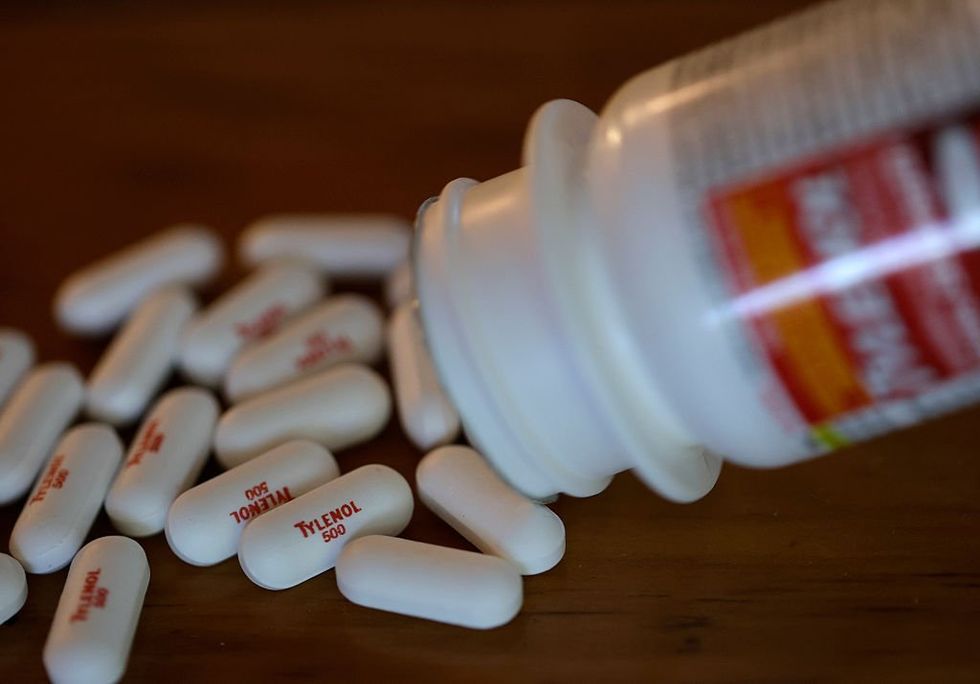President Donald Trump and Health and Human Services Secretary Robert F. Kennedy Jr. caused an uproar among medical establishmentarians and thin-skinned liberals on Monday by formally identifying acetaminophen as one of the alleged drivers behind the rise in American autism.
Acetaminophen, often sold under the brand Tylenol in the United States but known overseas as paracetamol, is the most common over-the-counter pain and fever medication used during pregnancy. Sales of the drug this year have an estimated value of $10.9 billion.
Kennedy indicated that the U.S. Food and Drug Administration will notify physicians that acetaminophen use by pregnant women may be associated with a “very increased risk” of neurological conditions like autism and ADHD in children.
The Department of Health and Human Services will also launch a nationwide public information campaign to alert parents and families to the possible risks of taking Tylenol during pregnancy.
“The Trump administration does not believe popping more pills is always the answer for better health,” said White House press secretary Karoline Leavitt. “There is mounting evidence finding a connection between acetaminophen use during pregnancy and autism — and that’s why the administration is courageously issuing this new health guidance.”
Foreign health officials rushed to defend the drug, suggesting that it is safe and effective.
Alison Cave, chief safety officer of the United Kingdom’s Medicines and Healthcare products Regulatory Agency, said in a statement, “There is no evidence that taking paracetamol during pregnancy causes autism in children.”
RELATED: Trump administration claims link between autism and Tylenol, greenlights remedy
 Photo Illustration by Justin Sullivan/Getty Images
Photo Illustration by Justin Sullivan/Getty Images
“Paracetamol remains the recommended pain relief option for pregnant women when used as directed,” added Cave.
The MHRA stressed further that patients should continue taking their pain medicines.
Steffen Thirstrup, the chief medical officer of the European Medicines Agency, also chimed in, stating that acetaminophen is an important option for treating pain or fever in pregnant women and that his agency’s “advice is based on a rigorous assessment of the available scientific data, and we have found no evidence that taking paracetamol during pregnancy causes autism in children.”
‘Exposure of susceptible babies and children to acetaminophen (paracetamol) induces many, if not most, cases of autism spectrum disorder.’
Tarik Jasarevic, a spokesman for the World Health Organization, told reporters on Tuesday that while some studies have suggested an association between prenatal exposure to the drug and autism, “evidence remains inconsistent.”
“If the link between acetaminophen and autism were strong, it would likely have been consistently observed across multiple studies,” added Jasarevic.
James Cusack, the autistic chief executive of Autistica, a London-based autism research charity, told Nature, “There is no definitive evidence to suggest that paracetamol use in mothers is a cause of autism, and when you see any associations, they are very, very small.”
Meanwhile, numerous liberals and other critics of the administration proved memers prophetic by downing fistfuls of acetaminophen as a form of protest.
While some of the pill-popping videos appear to have been recorded in jest, others are accompanied with humorless critiques of the administration’s efforts to identify and tackle the root causes of autism.
Ahead of Trump’s announcement on Monday, a spokesperson for Kenvue, the maker of Tylenol whose stock price took a nose dive on Monday, told Blaze News, “We believe independent, sound science clearly shows that taking acetaminophen does not cause autism. We strongly disagree with any suggestion otherwise and are deeply concerned with the health risk this poses for expecting mothers.”
When pressed about what the “sound science clearly shows,” Dr. William Parker, CEO of WPLab and visiting scholar at the University of North Carolina at Chapel Hill, told Blaze News:
The science tells us several things. Among the most important are: (a) Exposure of susceptible babies and children to acetaminophen (paracetamol) induces many, if not most, cases of autism spectrum disorder. b) Specific, invalid assumptions made when analyzing epidemiologic data have impeded recognition of the role of acetaminophen in the induction of autism.
Dr. Parker also cited his 2023 scientific review published in the Swiss peer-reviewed journal Children that concluded that “the very early postpartum period poses the greatest risk for acetaminophen-induced ASD, and that nearly ubiquitous use of acetaminophen during early development could conceivably be responsible for the induction in the vast majority, perhaps 90% or more, of all cases of ASD.”
RELATED: How MAHA can really save American lives
 Photo by Nathan Posner/Anadolu via Getty Images
Photo by Nathan Posner/Anadolu via Getty Images
Dr. Yuelong Ji, an assistant professor at Peking University, told Blaze News, “Officials should indeed advise caution regarding the unnecessary use of acetaminophen during pregnancy.”
Ji was among the researchers at the Johns Hopkins Bloomberg School of Public Health who collected umbilical cord blood from 996 births and measured the amount of acetaminophen and two of its byproducts in each sample.
According to the resultant National Institutes of Health-funded 2019 study published in the journal JAMA Psychiatry, “Cord biomarkers of fetal exposure to acetaminophen were associated with significantly increased risk of childhood ADHD and ASD in a dose-response fashion.”
“These results highlight the need for careful consideration of its use during this critical period of brain development,” Ji told Blaze News. “The potential mechanisms by which acetaminophen may affect the developing brain should be thoroughly investigated. Until this mechanism is better understood, it is prudent for health officials to adopt a cautious approach when advising pregnant individuals on acetaminophen use.”
The White House’s fact sheet concerning the president’s Tylenol-autism claims and the FDA’s relabeling of acetaminophen cites Parker’s and Ji’s studies as well as a recent NIH-supported systematic review that found positive associations of prenatal acetaminophen use with ADHD, ASD, or NDDs in offspring across dozens of high-quality studies.
It also cites the 2021 international consensus statement that recommends pregnant women “minimize exposure” to acetaminophen “by using the lowest effective dose for the shortest possible time.”
Like Blaze News? Bypass the censors, sign up for our newsletters, and get stories like this direct to your inbox. Sign up here!
The post Libs gobble Tylenol, foreign officials complain after Trump highlights autism link appeared first on TheBlaze.




